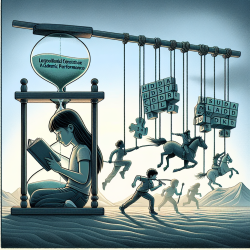Introduction
In the realm of speech-language pathology, understanding the nuanced challenges faced by children with reading disorders is crucial for developing effective interventions. A recent longitudinal cohort study titled The Associations Between Sluggish Cognitive Tempo, Internalizing Symptoms, and Academic Performance in Children With Reading Disorder sheds light on the impact of sluggish cognitive tempo (SCT) on children with reading disorders (RD), particularly in relation to anxiety and academic performance.
Understanding Sluggish Cognitive Tempo
Sluggish cognitive tempo is characterized by symptoms such as daydreaming, mental confusion, and lethargy. Historically, SCT has been associated with ADHD, but recent research, including the study by Hossain et al. (2022), suggests that SCT is a distinct construct with unique implications for children with RD.
Key Findings from the Study
The study, conducted over 18 months with 147 children aged 6-18, revealed significant associations between SCT and both anxiety and academic performance. Notably, teacher-reported SCT was positively associated with anxiety and negatively associated with academic performance, particularly in children with low levels of ADHD-Inattention (ADHD-IN) symptoms.
- Anxiety: Teacher-reported SCT was linked to increased anxiety, highlighting the need for educators to be vigilant in observing and addressing anxiety symptoms in children with RD.
- Academic Performance: SCT negatively impacted academic performance, suggesting that interventions targeting SCT could enhance educational outcomes.
Implications for Practitioners
For practitioners, these findings underscore the importance of considering SCT in the assessment and intervention planning for children with RD. Here are some strategies to enhance outcomes:
- Comprehensive Assessments: Incorporate SCT assessments in routine evaluations for children with RD to identify those at risk of anxiety and academic challenges.
- Targeted Interventions: Develop interventions that specifically address SCT symptoms, such as cognitive-behavioral strategies to improve attention and reduce anxiety.
- Collaborative Approaches: Work closely with educators to monitor and support children with SCT in the classroom, ensuring that interventions are contextually relevant.
Encouraging Further Research
While this study provides valuable insights, further research is needed to explore effective interventions for SCT in non-ADHD populations and to understand the long-term impact of SCT on academic and emotional outcomes. Practitioners are encouraged to contribute to this growing body of research by sharing their observations and outcomes from implementing SCT-focused interventions.
To read the original research paper, please follow this link: The Associations Between Sluggish Cognitive Tempo, Internalizing Symptoms, and Academic Performance in Children With Reading Disorder: A Longitudinal Cohort Study.










